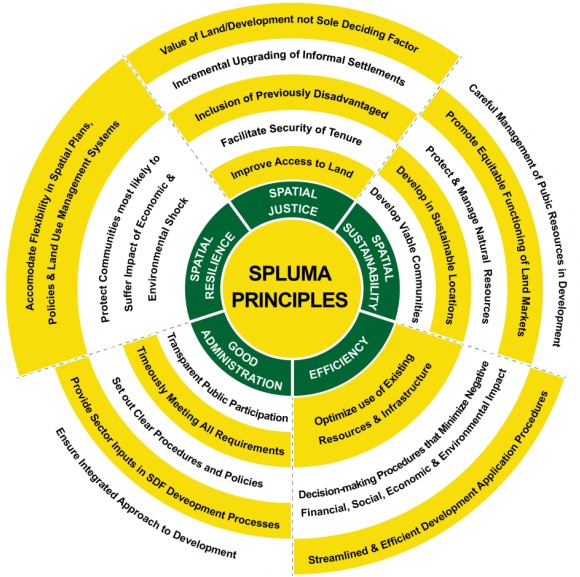WHAT IS THE SPATIAL PLANNING AND LAND USE MANAGEMENT ACT OR “SPLUMA” AS IT IS NOW COMMONLY REFERRED TO?
SPLUMA is a national framework legislation which came into operation on the 1st of July 2015. SPLUMA’s primary aim is to provide national, provincial and municipal spheres of government with a framework relating to the establishment of policies and systems relating to land use management.
Historically each province had its own set of Acts governing land use within its boundaries. SPLUMA unifies all the provinces under one national legislation. SPLUMA replaces a number of Acts such as Removal of Restrictions Act 84 of 1967, Physical Planning act 88 of 1967, Less Formal Township Establishment Act 113 of 1991, The Physical Planning Act 125 of 1991 and the Development Facilitations Act 67 of 1995.
HOW DOES SPLUMA AFFECT THE MUNICIPALITIES?
Each municipality must approve and adopt a single land use management scheme for its entire area within 5 years from enactment date of SPLUMA. The land use scheme must take into account various requirements set out in SPLUMA including but not limited to appropriate categories of land use management, compliance with environmental legislation and provisions to promote the inclusion of affordable housing. Each municipality must pass by-laws to formulate the procedures they will follow to give effect to and enforce the provisions of SPLUMA. Each municipality will have to approve and publish by-laws to give effect to SPLUMA for example the City of Johannesburg has approved and published its by-laws called the City of Johannesburg Municipal Planning By-laws, 2016. Municipalities must establish a Municipal Planning Tribunal to determine land use and development application within its jurisdiction.
HOW DOES THIS SPLUMA AFFECT DEVELOPERS AND CONVEYANCERS?
Applications for rezoning, township establishment, subdivision of land, consolidation of different pieces of land and removal, amendment or suspension of restrictive conditions are now governed by SPLUMA and must be brought in accordance with the processes set out in the relevant municipal By-laws. For example, if a developer wanted to bring an application for the establishment of a township within the jurisdiction of the City of Johannesburg then the application will be brought in terms of section 26 of the City of Johannesburg Municipal Planning By-laws, 2016. If the application is approved and all conditions of establishment or pre-proclamation conditions have been complied with then a certificate is issued in terms of section 28(11) of the City of Johannesburg Municipal Planning By-laws, 2016. This was previously known as a section 101 approval. The conveyancer can then apply to the Deed’s Office for the opening of the Township register. Once the register is open and the township proclaimed the municipality would then grant permission to proceed with the transfer of the erven within the township by issuing a section 29 certificate in terms of the City of Johannesburg Municipal planning by-laws, 2016 (previously the section 82 certificate).
It is important to note that each municipality will have its own by-laws so the relevant sections for applications and the certificates referred to above will differ.
SOME IMPORTANT POINTS TO REMEMBER
All applications must be submitted to the relevant municipality who will determine when the municipal planning tribunal or an authorized official will deal with same in accordance with their allocation procedure. All conditional approvals referred to in terms of section 41 of SPLUMA will lapse if the conditions are not complied with within 5 years from date of approval. An approval may prescribe within a shorter time period and any extension granted cannot exceed 5 years from date of original approval. Section 53 of SPLUMA prohibits any act of registration without the approval of the municipality. The municipality is governed by strict time-lines as are the various Departments that need to provide clearance. Lastly as with all legislation that is newly introduced the procedure and practices will be perfected with time, case-law and sometimes even amendments.
This newsflash has been prepared for information purposes only and does not constitute legal advice, or a legal opinion, the practical application of the provisions of this newsflash will vary depending on the facts of each case.

